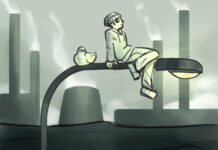I advocate for many things. Abortion is not one of those things.
I will address this and all its related issues and sides again more in depth. This will include how the Christian Church has again thoroughly mucked up its response to an important issue. On the other hand, I do not believe that that feminism is inherently mutually exclusive with being pro-life, or Christian for that matter. Perhaps pro-life could simply mean not advocating for abortion, as opposed to verbally and emotionally abusing women that believe otherwise. Eventually, I hope to address all these various sides and stances that people take in regards to abortion, whether pro-choice, pro-life or somewhere in between, all in gentleness and with grace.
But the thing I want to address today is adoption, specifically in regards to foster care. Adoption is not, and should not be a cop-out. Unfortunately, it is often used as such in pro-lifers arguments against abortion.
This is not to say adoption is not a viable alternative to abortion, or that everyone who is pro-life is flippant about adoption. But I do believe that everyone who is passionate about “adoption, not abortion,” must inherently also be as zealous for justice in the foster care system. It’s easy to say to women considering abortion, “choose adoption.” But what proves whether we are genuine or flippant about it is whether we are willing to be the person on the other side doing the adopting, or at least actively advocating for those waiting for adoption, ensuring that these children not only live, but also go on to thrive. What pro-lifers say about adoption must be found in their actions as well. This is especially important for Christians, who by creed believe faith is dead without works. And unfortunately, action is often missing, especially when it concerns foster care.
On one hand, the Christian Church has begun taking greater action in regards to international adoption. There is a greater awareness of the needs of children abroad, and slowly, a greater move to address it, which is absolutely wonderful. However, the biases that still stand against foster care kids makes me concerned that not all things that need to be corrected have been corrected. This is especially relevant in America, where a broken, often unjust foster care system, that often ends up mistreating instead caring for the children its charged with, somehow manages to coexist with an alarmingly apathetic, if not discriminatory, sentiment towards those same children being wronged. The Church is not innocent of this attitude. We preach, raise money and go on mission trips to build orphanages and serve with children abroad. But from what I have seen from my fifteen-plus years in the Church, we are ominously silent when it comes to foster care kids. And I cannot help but conclude that while children outside the country are often considered ‘orphans’ who deserve loving families and parents to stick it out with them, children bearing the label of ‘foster care,’ especially if they are older, are still too often perceived or differentiated as delinquent, unruly or much to handle. In other words, they have too much baggage to be fit for a loving family. It’s the uglier, but more honest way of saying it.
That does not sit well with me. Until we consider all children, whatever age, whatever ethnicity, and whatever background, as worthy of families who love them and will stick through whatever challenges and baggage they need to work through, “adoption not abortion” will remain susceptible to being a cop-out statement for pro-lifers, and the Christian Church. Until the labels ‘orphan’ and ‘foster care’ are no longer differentiated, and until all children are considered worthy of adoption, we will remain in danger of being in love simply with our own benevolence, and our own righteousness. We will remain on the edge of loving having a “colorful” family, loving have the appearance of justice, or simply loving the prospect of having children, more than loving actually children that need to be loved.
It is not to say that everyone should be feel obligated to adopt. Not all parents or families should or are meant to adopt—some people will have lifestyles that simply just do not fit adoption. What I am more concerned about here is mindset. Regardless of whether or not someone is called to adopt, labels and biases that may have been internalized or vocalized must be removed, whether it is bias against ethnicity, age or a foster care background. At the end of the day, all children deserve to be loved and cared for.
Furthermore, when a family does decide to move towards adoption, it is natural to not be ready. No one is born automatically ready to give love without expecting to receive any in return immediately. In other words, no one is born ready to adopt, and prospective adoptive parents should take the time they need to prepare themselves for adoption, whether international or domestic, foster care or not. It is humble, not shameful, to admit to the need to prepare.
However, adoption should never be flippant. International or foster care, no matter how unruly, children are not to be bought and returned according to how adoptive parents feel day to day. That does not mean that it will not be hard, or that feeling like it is hard is a shameful thing. Young children and teens alike will have their own struggles, and loving them means bearing that pain with them. No matter how much they prepare, parents will be tired, will be discouraged, and perhaps feel like they cannot handle it all. And it is okay to feel that way. In the face of such discouragement, it is important for adoptive parents to remember that there is support available, and to reach out for it. Nevertheless it is also important to continue to remember that adoption is covenant.
In summary, if you are going to take the “adoption, not abortion” stance, you better be ready to do your part. If you are called to adopt, love those children like they are your own, because they have become and are your own. If you are not called to adopt, that is fine. But prove what you say by caring where adoption leads the children you are advocating for. Where there is injustice in the adoption or foster care system, advocate against it. If you are indeed for “adoption, not abortion,” then you will care not just that children survive to be born, but that they get the chance to truly live. Only then can you truly call yourself pro-life.
![]()


































